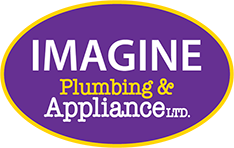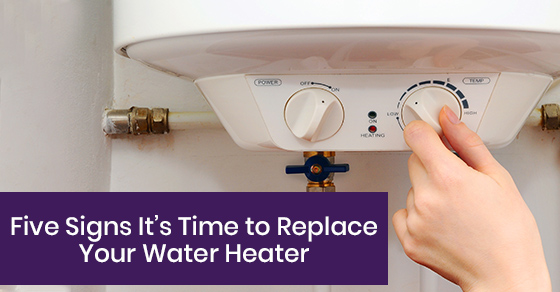The water heater in your home is of the utmost importance to your comfort and to the comfort of those living in the property. The data shows that the water heater accounts for 19% of the energy used in the average Canadian home. Whether it’s being used for laundry or for your morning shower, your water heater must be in optimal condition to perform effectively. To help protect you against heater failure in future, our experts for water heater and water softener installation in Calgary explain the five signs it’s time to replace your water heater in this latest post.
Rust is Found in the Water
When corrosion occurs on the steel surface of your water heater, it spreads and eats through the steel at specific spots. On water pipes, in particular, rust is considered a clear sign that a leak is about to occur. Another indicator of a problem with your water heater is rust appearing in the water.
Rust often occurs in heaters that are used beyond their expiration date. You may also spot rust on the water inlet or the relief valve on the heater. And there’s no chance of restoring the water heater once you notice rust in these key areas of the system.
It’s important to make sure that the problem is with your water heater and not your pipes. To ensure the heater is to blame, drain several buckets of hot water from the tank. If, after three bucket loads, the water is still rusty the problem is definitely related to your hot water heater tank and not to your piping.
Your Water Heater is Too Old
The average homeowner is likely to find their water heater requires replacement at some point during their ownership. However, most don’t have a clear understanding of the expiration date for their system. Your home water heater is likely to last between 8 and 10 years when maintained effectively.
If you notice leaks or rusting at any time when reviewing your system, this could be a clear sign the unit has reached its useful lifetime limit and must be replaced.
Water Doesn’t Heat to the Required Level
You might also find that the heater doesn’t reach the maximum required water temperature level. Without a specific temperature of water, you won’t be able to wash your clothes or take that hot shower. And so it should be clear when your water isn’t reaching the peak levels of heat required.
A lack of optimal heat from your water heater is usually due to one of the following specific issues. The first is the heating element, which might have been broken during regular use. The problem could also be related to a badly installed thermostat, or due to using a tank that’s too small for the home, and thereby not able to supply the adequate amount of heated water.
To re-calibrate your thermostat, you should ensure that the system reads between 120 and 140 degrees Fahrenheit. If the problem relates to a broken heating element, you can simply call your local plumber to repair the issue. The job shouldn’t take too much time to complete for experienced professionals.
The likeliest cause of a lack of hot water coming from your water heater is that the tank is too small to supply the entire home. In this case, you might require replacement with a larger system to ensure each of the needs within the home is met with an efficient water heater.
Noise is Coming from the Heater
One of the more common indications of a problem with your water heater is when noise is coming from the heating system. As the system ages, rumbling noises may begin to emerge during regular use. When the heater is used regularly in large family homes, these noises will become even more pronounced.
The noise is often related to sediment buildup within the system. The sediment starts to form on the bottom of the heater as a result of the minerals in the water. Over time, this sediment hardens and thickens, and small pieces can break off and float within the heater. The noise is related to the sediment impacting the interior.
Sediment buildup causes a number of other issues within your water heater. For example, it causes the system to strain to produce the same level of heat, thereby decreasing the system’s energy efficiency. Sediment can also damage the structure of the heater, leading to problems related to cracks in the equipment.
To mitigate issues with noise in your heater, you might try flushing the sediment from the system. The system should be flushed on an annual basis to ensure it works efficiently. If the tank still makes noises after the flush, there is likely a more serious problem that requires water heater replacement.
Water Around the Heater
Another of the more common signs of a problem with your water heater is the presence of water around the base of the heater. The presence of water generally means there’s been a significant leak in the system that must be addressed.
Water leaks are often caused by an expansion of the metal within the water heater’s tank. When the metal expands at the height of each heating cycle, small amounts of water can leak through, with the gaps in the metal growing with each system use.
A potential alternative cause for water around the heater might be the heater’s fittings. You should check both the fittings to the tank and the overflow pipe for signs of moisture. If you detect water in these areas, it’s important that you call a water heater repair professional to examine the issue. They may be able to rectify the problem by tightening the fittings.
Turn to our Team at Imagine Plumbing for Water Heater Guidance
Our experts at Imagine Plumbing have decades of experience in water heater and water softener installation in Calgary. You can turn to our team when you require a fast response to your home system issues. We’ll begin with a consultation to help you understand your home equipment issue and to introduce you to our team and services. Our team will then schedule a home visit with you to review your equipment and provide the required service. Whether you require repairs, maintenance, or a new system, we have the ideal solution.
To learn more about our water heater services, call our offices today!


